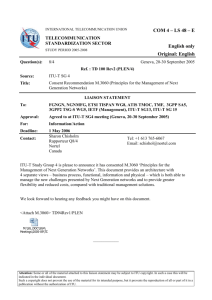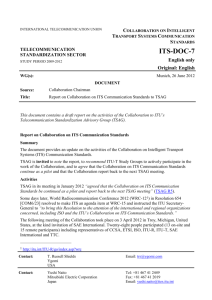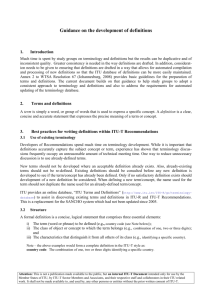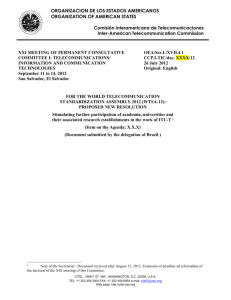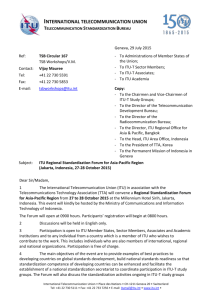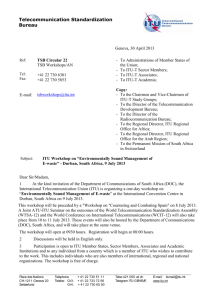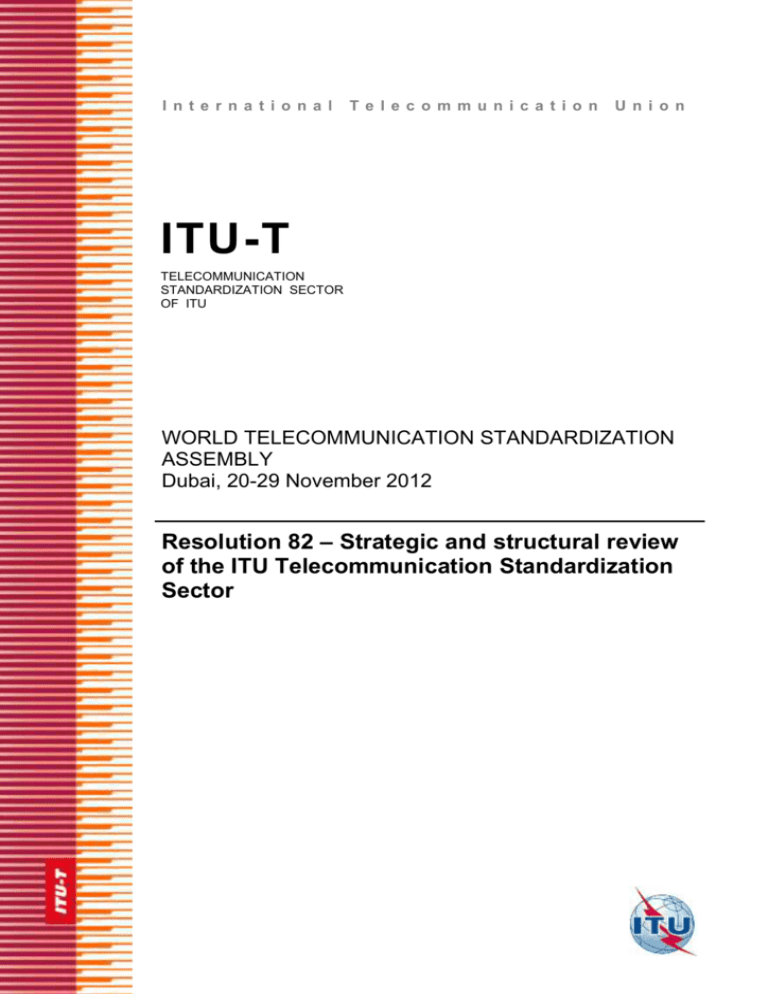
I n t e r n a t i o n a l
T e l e c o m m u n i c a t i o n
U n i o n
ITU-T
TELECOMMUNICATION
STANDARDIZATION SECTOR
OF ITU
WORLD TELECOMMUNICATION STANDARDIZATION
ASSEMBLY
Dubai, 20-29 November 2012
Resolution 82 – Strategic and structural review
of the ITU Telecommunication Standardization
Sector
FOREWORD
The International Telecommunication Union (ITU) is the United Nations specialized agency in the field of telecommunications. The ITU Telecommunication Standardization Sector (ITU-T) is a permanent organ of ITU. ITU-T is
responsible for studying technical, operating and tariff questions and issuing Recommendations on them with a view to
standardizing telecommunications on a worldwide basis.
The World Telecommunication Standardization Assembly (WTSA), which meets every four years, establishes the
topics for study by the ITU-T study groups which, in turn, produce Recommendations on these topics.
The approval of ITU-T Recommendations is covered by the procedure laid down in WTSA Resolution 1.
In some areas of information technology which fall within ITU-T's purview, the necessary standards are prepared on a
collaborative basis with ISO and IEC.
ITU 2013
All rights reserved. No part of this publication may be reproduced, by any means whatsoever, without the prior written
permission of ITU.
RESOLUTION 82 (Dubai, 2012)
Strategic and structural review of the ITU
Telecommunication Standardization Sector
(Dubai, 2012)
The World Telecommunication Standardization Assembly (Dubai, 2012),
noting
a)
that the ITU Telecommunication Standardization Sector (ITU-T) is a unique global standardization
body in the telecommunication field comprising governments, regulators, manufacturers, operators,
academia and other related bodies;
b)
that, under Article 17 of the ITU Constitution, ITU-T, bearing in mind the particular concerns of the
developing countries, is to fulfil the purposes of the Union relating to telecommunication standardization by
studying technical, operating and tariff questions and adopting Recommendations on them with a view to
standardizing telecommunications on a worldwide basis;
c)
that, under Article 13 of the ITU Convention, the World Telecommunication Standardization
Assembly (WTSA) is required, inter alia, to approve the programme of work for ITU-T for each study
period and to determine the priority, urgency, estimated financial implications and time-scale for the
completion of studies;
d)
that Resolution 122 (Rev. Guadalajara, 2010) of the Plenipotentiary Conference resolves that
WTSA shall adequately address strategic issues in standardization, and encourages Member States, ITU-T
Sector Members and study group chairmen and vice-chairmen to concentrate, inter alia, on the identification
and analysis of strategic issues in standardization in their preparations for WTSA so as to facilitate the work
of the assembly;
e)
that, under Article 50 of the Constitution, the Union should cooperate with international
organizations having related interests and activities;
f)
Resolution 22 (Rev. Dubai, 2012) of this assembly, on authorization for the Telecommunication
Standardization Advisory Group (TSAG) to act between WTSAs;
g)
that Resolution 68 (Rev. Dubai, 2012) of this assembly instructs the Director of the
Telecommunication Standardization Bureau (TSB) to organize meetings for high-level industry executives,
e.g. chief technology officer (CTO) meetings, in order to assist in identifying and coordinating
standardization priorities and subjects to minimize the number of forums and consortia,
considering
a)
that ITU-T conducts studies responding to changing technology and market needs, and should do so
in a timely and appropriate manner;
b)
that ITU-T Recommendations are developed in study groups corresponding to specific aspects, and
a number of efforts have been made to facilitate coordination among study groups, such as Resolution 45
(Rev. Dubai, 2012) of this assembly;
WTSA-12 – Resolution 82
1
c)
that, in addition to designated lead study groups, joint coordination activities (JCA), global
standards initiatives (GSI), technical and strategic reviews (TSR) and focus groups (FG) are established for
the study of issues and effective coordination among ITU-T study groups and other standards organizations;
d)
that, in today’s standardization environment, the current structure and work methods of ITU-T
could evolve to respond more fully to the rapid change in technologies and market needs in a timely and
appropriate manner as well as enhance coordination of activities of all study groups of ITU-T, the ITU
Radiocommunication Sector (ITU-R), the ITU Telecommunication Development Sector (ITU-D) and other,
external organizations;
recognizing
a)
that overall coordination of JCAs, FG and other ITU-T groups might be needed;
b)
that, in terms of the structure of ITU-T, there are still some views that study groups should be
restructured and/or current structural arrangements, including the purpose and objectives of JCAs, GSIs,
TSRs, FGs, etc., should be examined;
c)
that there is a need to consider improvements in coordination and collaboration arrangements
between ITU-T and ITU-R, ITU-D, other standards-making entities and other relevant entities, while
avoiding overlap with TSAG functions under No. 197F (Article 14A) of the Convention;
d)
that, under Article 13 of the Convention, WTSA can establish other groups,
resolves
to establish, in accordance with Nos 191A and 191B of the Convention, a review committee functioning in
accordance with the relevant provisions of Article 14A of the Convention and the procedures provided
below, and with the terms of reference as described in Annex A to this resolution, taking account of today’s
standardization environment and of the continued evolution of ITU-T;
instructs the Review Committee
1
to report to TSAG on regular basis;
2
to consider the outcomes of the CTO meetings, in particular their reports;
3
to conduct its initial review in a timely manner so as to provide input to TSAG for the preparation
of the ITU-T strategic plan;
4
to submit its report to the next WTSA through TSAG,
instructs the Telecommunication Standardization Advisory Group
1
to consider the Review Committee progress reports, and in conformity with Article 14A of the
Convention, implement, as appropriate, any recommendations, pending consideration at the next WTSA,
2
to submit the final report of the Review Committee, without changes, to WTSA, together with its
comments thereon,
2
WTSA-12 – Resolution 82
instructs the Director of the Telecommunication Standardization Bureau
1
to support the Review Committee by facilitating the activities in implementing this resolution;
2
to provide fellowships to eligible developing countries.
ANNEX A
(to Resolution 82)
Review Committee – Terms of Reference
1
Examine the adequacy of the current structure of ITU-T to facilitate the Sector’s continued
evolution and to deal with the increasing demands for timely and appropriate results to meet market demand,
taking account of the current and future standardization environment.
2
Review the current coordination and collaborations mechanisms with other standards bodies and
propose improvements.
3
Review existing models for collaboration between ITU-T and other standards bodies, given the
accelerated rate of change in the worldwide standardization landscape, and the rapidly evolving needs of
consumers/users of global standards.
4
Identify and propose new modalities for cooperation and collaboration based on mutual respect and
recognition of evolving roles and responsibilities in the standards sphere.
5
Identify ways and means to enhance cooperation with other standards bodies, with a view to
minimizing conflict of their standards with ITU-T standards.
6
Develop and propose recommendations for a set of principles for standards development within
ITU-T that facilitate interoperability and promote further innovation.
7
Develop a work plan by which to conduct the review, and establish the structure of the report.
8
Conduct its initial review in a timely manner so as to provide input to TSAG for preparation of the
ITU-T strategic plan in accordance with Article 14A of the Convention.
WTSA-12 – Resolution 82
3
9
The Review Committee is established by this assembly and shall present its report to WTSA-16
without changes through TSAG. In addition, the Review Committee shall report its progress to TSAG on a
regular basis and take into account the comments made by TSAG on the progress report.
10
Taking into account the role and functions of TSAG, as outlined in Article 14A of the Convention,
the Review Committee shall provide reports to TSAG, with a view to, inter alia, identifying any specific
actions which could be undertaken or implemented in the near term, and/or those which could be conveyed
by means of a report from the Director of TSB for decision by the Plenipotentiary Conference.
11
The Review Committee is open to:
a)
ITU-T Member States, Sector Members and academia1;
b)
representatives of other organizations not covered in a) above, to join the meetings where the
subject matter of these other organizations is discussed, together with other experts, including
Associates, invited by the chairman in consultation with the vice-chairmen and the Director of TSB.
12
To enhance participation of the regions, the Review Committee shall work with the existing ITU
regional groups, including the regional groups of the ITU-T study groups, and take into consideration their
contributions. The Review Committee shall coordinate with the Director of TSB, to ensure the provision of
fellowships for one participant from each eligible developing country.
13
The Review Committee shall operate in English or the six official languages if so requested.
Reports to TSAG shall be translated in the six official languages of the Union.
14
The meetings of the Review Committee shall be paperless and shall make use of electronic working
methods in accordance with Resolution 32 (Rev. Dubai, 2012) of this assembly.
15
The Review Committee shall meet immediately prior to TSAG.
16
The duration of each Review Committee meeting shall not exceed three working days.
17
The management team of the Review Committee shall consist of a chairman and up to six vicechairmen, taking into account equitable geographical distribution.
18
The final report of the Review Committee shall be translated and made available to the final TSAG
meeting before WTSA-16. The Review Committee shall end in 2016, unless WTSA-16 decides to renew it.
____________________
1
4
In accordance with Resolution 169 (Guadalajara, 2010) of the Plenipotentiary Conference, on the admission of
academia, universities and their associated research establishments to participate in the work of the three Sectors of
the Union, academia should not have a role in decision-making.
WTSA-12 – Resolution 82

